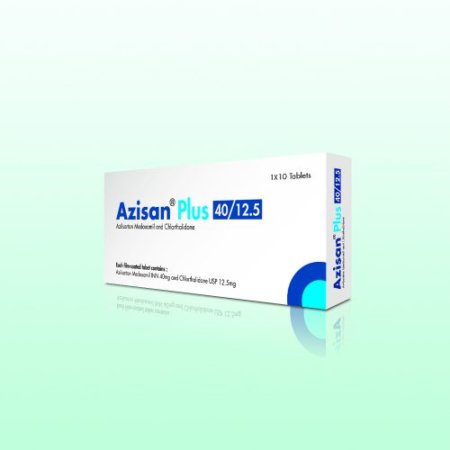
Type:10 Tablets
Generic Name:Azilsartan + Chlorthalidone
Manufacturer:Renata Limited
Price:৳220.00
Hypertension, Treatment of hypertension in patients not adequately controlled with monotherapy or as initial therapy in patients likely to need multiple drugs to help achieve blood pressure goals
May be taken with or without food.
Adult Oral Hypertension 1 tab (40 mg/12.5 mg) once daily. May increase to 40 mg/25 mg after 2-4 weeks as needed to achieve blood pressure goals; not to exceed 40 mg/25 mg daily Switching from ARB or diuretic monotherapy: Initiate with 40 mg/12.5 mg PO qDay Hepatic impairment Mild-to-moderate: No dose adjustment required for azilsartan Severe: Azilsartan has not been studied in patients with severe hepatic impairment Chlorthalidone may cause mild alterations of fluid and electrolyte balance that may precipitate hepatic coma in patients with impaired hepatic function or progressive liver disease
Safety and efficacy not established
Renal impairment Mild-to-moderate (eGFR 30 mL/min/1.73 sq.meter or greater): No dose adjustment required Severe (eGFR <30 mL/min/1.73 sq.meter): Safety and effectiveness not established Chlorthalidone may precipitate azotemia
Hypersensitivity. Patient w/ anuria. Concomitant use w/ aliskiren in patients w/ diabetes. Pregnancy.
Angiotensin II blocker; displaces angiotensin II from AT1 receptor and may lower blood pressure by antagonizing AT1-induced vasoconstriction, aldosterone release, catecholamine release, arginine vasopressin release, water absorption, and hypertrophic responses Chlorthalidone produces diuresis with increased excretion of sodium and chloride at the cortical diluting segment of the ascending limb of Henle’s loop of the nephron
Hyperuricemia Hyperuricemia may occur or frank gout may be precipitated in certain patients receiving chlorthalidone or other thiazide diuretics Fetal toxicity When pregnancy is detected, discontinue as soon as possible; drugs affecting renin-angiotensin system causing oligohydramnios, which may result in fetal injury and/or death Hypotension in volume or salt depleted patients Electrolytes Hypokalemia is a dose-dependent adverse reaction that may develop with chlorthalidone; Edarbyclor attenuates chlorthalidone-associated hypokalemia Coadministration of digitalis may exacerbate adverse effects of hypokalemia Thiazide diuretics can cause hyponatremia and hypokalemia; drugs that inhibit the renin angiotensin system can cause hyperkalemia; monitor serum electrolytes periodically Lactation: Unknown whether azilsartan distributed in breast milk, thiazide-like diuretics are excreted in human milk; consider alternate antihypertensive therapy or do not breastfeed
1-10% Dizziness (8.9%) Fatigue (2%) Hypotension (1.7%) <1% Syncope (0.3%)
Pregnancy Category: D Discontinue as soon as possible when pregnancy is detected; use during second and third trimesters affects renin-angiotensin system causing oligohydramnios, which may result in fetal injury and/or death (see Black Box Warnings and Cautions) Lactation: Unknown whether azilsartan distributed in breast milk, thiazide-like diuretics are excreted in human milk; consider alternate antihypertensive therapy or do not breastfeed
Elderly, vol-depleted patients or w/ compromised renal function, co-administration of NSAIDs, including selective COX-2 inhibitors, w/ angiotensin II receptor antagonists (including azilsartan) may result in deterioration of renal function, including possible acute renal failure. Dual blockade of the renin angiotensin system w/ angiotensin receptor blockers, ACE inhibitors or aliskiren is associated w/ increased risks of hypotension, hyperkalemia & changes in renal function (including acute renal failure). Concomitant use w/ aliskiren. Reduced lithium clearance by diuretics eg, chlorthalidone increasing the risk of lithium toxicity.